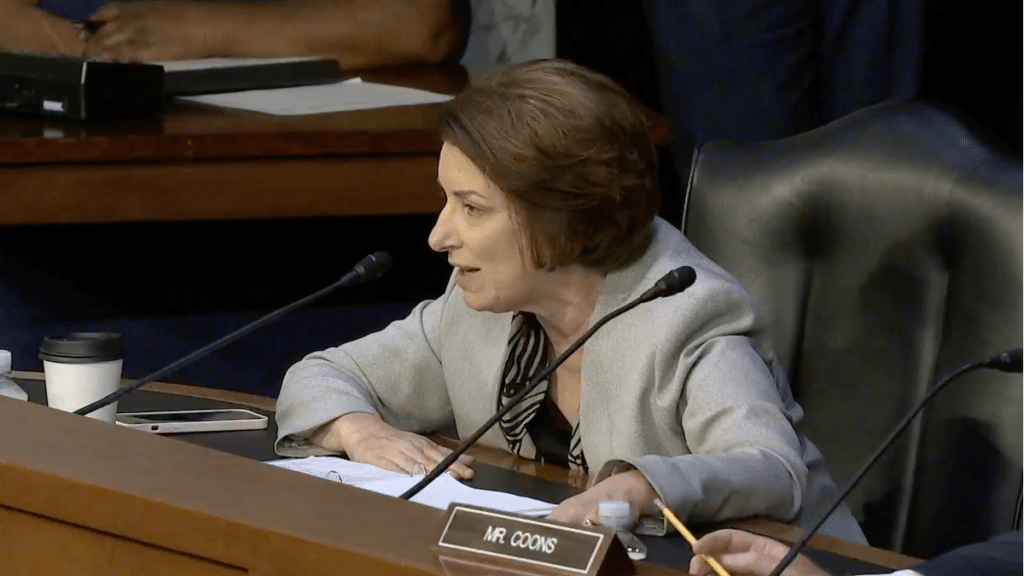Exchanging Links for Cash Is No Way to Save Journalism
Timothy Karr / Jun 22, 2023Timothy Karr is the senior director of strategy and communications at Free Press.

Last Thursday, the Senate Judiciary Committee voted to advance the controversial Journalism Competition and Preservation Act (JCPA). Identical legislation, which moved through this same committee last year, failed to advance to the Senate floor or receive any consideration in the House due in part to widespread opposition from digital rights advocates and small publishers.
Its primary sponsor, Sen. Amy Klobuchar (D-MN), sees the JCPA as a way, in her words, “to make sure that news organizations are able to negotiate on a level playing field” for compensation from tech companies like Google and Facebook that feature links to news sites.
Bargaining code legislation like the JCPA is being adopted worldwide. These laws are built on the premise that only big tech platforms benefit from featuring these links. The JCPA was drafted to balance what Sen. Klobuchar and others see as a disparity in this exchange. The reality, though, is that the benefits of linking are mutual — a tradeoff that the JCPA explicitly forbids from being considered when outlets negotiate for payment.
Lobbyists for the large news media firms that will gain the most from this legislation claim that their news outlets are “being forced to give content and revenue to Facebook and Google with inadequate return.” But the data indicate that these outlets willingly participate in the exchange. The reason is simple: increased site traffic from links on tech platforms equals increased revenues for ads sold on news sites.
But this trade of links for traffic has been undergoing upheaval on Facebook. According to industry analysts, the social media platform ranks as the largest single source of social referral traffic for publishers — generating around seven times more traffic than Twitter, its closest competitor. But in May these outlets measured a precipitous drop in traffic from Facebook — down 50 percent by comparison to May 2022, according to data collected from more than 2,000 publishers.
It’s a decline that has many reeling. Earlier this year, BuzzFeed News shut down operations after its owners realized that it’s impossible to sustain a news business that’s overly dependent on traffic from social media shares. In the case of Facebook, BuzzFeed was left at the whim of any tweaks the platform made to its promotion algorithms.
EchoBox, the analysts that conducted the publisher survey, argues that the most recent drop in traffic “could be the result of a deliberate deprioritization of news content on Facebook,” speculating that Facebook’s algorithmic shift could be the platform’s reaction to the introduction of bargaining code rules in Australia and (soon) Canada, and the consideration of similar measures from lawmakers in Brazil, South Africa, the United Kingdom, the United States and other countries. A state-level bill modeled on the JCPA is also making its way through California’s legislature.
Having its cake and eating it too
Like it or not, Facebook, as a private enterprise, is entitled to change its algorithms to boost its bottom line. By adjusting its algorithms to minimize the reach of news links, the social network is simply pre-gaming any potential payment negotiations it might be forced to have. The platform’s logic is straightforward and goes something like this: the fewer views Facebook sends to a given news site, the less it’s obligated to pay that site.
While we at Free Press Action are no fans of giant tech platforms, we believe that bills like the JCPA are built on a shaky understanding of the economics of online media and news production.
The JCPA prohibits those who engage in payment negotiations from considering the value that news publishers receive from being present on platforms. This prohibition all but mandates that these outlets bargain with social networks and search engines in a way that’s divorced from any real understanding of the interactive marketplace.
But publishers still want to have it both ways: to get paid for having their links feature on Facebook and to get paid as a result of the traffic such links drive to their sites. JCPA proponents claim that Facebook is having its cake and eating it too. But when the platform decides to stop pushing traffic to news sites in its algorithm, these same lobbyists cry foul: ‘But we need Facebook to boost our traffic and ad sales!’
Loading the news cycle with clickbait
Writing legislation based on social media sharing metrics is a bad idea. For example, the California version of this bill calls for negotiations to be based on the number of links presented by a platform. Though less explicit, other bargaining code bills assign value to the volume of impressions (or views) a given link generates, and not to the quality of the news item itself. As such, news publishers have a built-in incentive to produce low-value, high-engagement content — also known as clickbait — over the kinds of news and information people need to participate fully in our democracy.
The media marketplace is simply responding to a considerable public taste for junk news. This is a phenomenon that’s true not only online but in traditional media. It’s a quirk of human nature that has a predecessor in the popularity of tabloid journalism of the 20th century and yellow journalism before that.
In short, a bargaining code model built on such clickable metrics loads the news cycle with stories that scream the loudest at the expense of accuracy and depth. Less measurable outcomes, like whether an article inspires a person to get involved in their community or speak out against an injustice, aren’t part of the JCPA’s calculus for “saving journalism.”
And that’s the problem with bargaining code legislation. It isn’t designed to address the problem at the root of the journalism crisis: a massive decline in the production of local news and civic information, and in the sort of reporting that holds powerful people accountable.
Better ways to support a public good
Instead of forcing platforms to cut one-to-one deals with publishers, we should create an independent fund to support public-interest journalism — and especially the local, independent journalism and civic information that are in short supply across the country.
As a better alternative, Free Press has proposed an ad tax that would be levied on online advertising revenues. A one-percent tax would generate around $2 billion annually — which would fund a public-interest media endowment that would place a premium on funding civic engagement and accountability journalism over clickbait and disinformation.
Unlike excise taxes on products like cigarettes and gasoline, a tax on advertising would be levied not against individual consumers but against enterprises like Google and Meta that profit from ad sales, but don’t use a significant percentage of these revenues to support news production.
Since journalism is a public good, it needs public support. It makes economic sense to tax advertising instead of forcing warped and often opaque negotiations between individual platforms and news outlets. The ad tax route would have a minimal impact on consumers while ensuring that monies fund innovative journalism efforts in communities that have been hardest hit by the lack of local news and information.
As such, an ad tax is a far more efficient way to subsidize local news. Unlike the JCPA, it wouldn’t rely on a convoluted bargaining code that’s built on a false understanding of the news business. Instead, this approach recognizes the actual economics of news, treats journalism as a public good and creates a structure through which funds actually support the production and distribution of news and information that are needed most.
Authors
